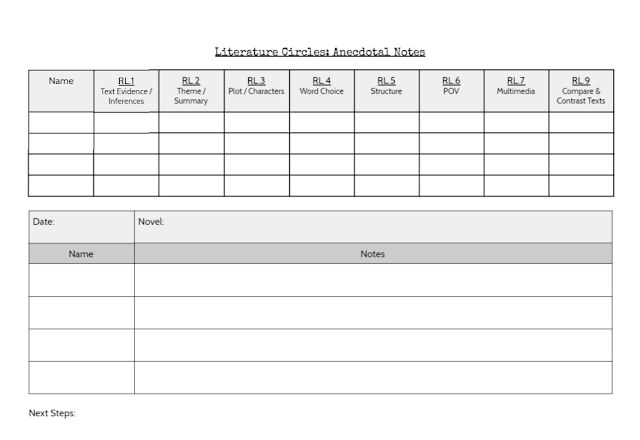Literature Discussion
The best part of Literature Circles is the discussion! After students have read the selected pages and taken notes, they should be ready to discuss the book with their group. If I notice that a student is struggling with some part of the preparation, I will confer with him/her before the group meets.Early in the year, I explicitly teach how to have an academic discussion through modeling and guided practice. As a reminder during Literature Circle discussions, I have sentence stems behind the group meeting table.
 |
| Accountable Talk Sentence Stems |
Student Thinking
After that, it's up to my students to keep the discussion going for at least 5 minutes. If students bring lots of evidence of their thinking, this is usually no problem. Some groups can even keep the discussion going for much longer. During this time, I am jotting down my own notes on the discussion and individual students' contributions. If I do speak, it is usually to ask one of two questions:
- Why do you think that? (pushes for text evidence)
- Why do you think the author did that? (pushes for thinking about craft & structure)
These are great questions because they deepen the discussion while still validating and keeping students' thoughts front and center.
Genre Specific Questions / Strategies
Once the conversation lulls or I want to redirect the students' conversations back to some content area standards, I will start to ask some genre specific questions. I want to ask questions or teach strategies that are not specific to the book students are reading. For example, I might ask students to think about possible themes the author is getting at. If students are struggling to answer, I might introduce them to a strategy, such as "Words of the Wiser" from Notice & Note: Strategies for Close Reading. I make sure to jot down plenty of notes on students' responses for assessment purposes.
Book Specific Questions
 While my goal is not to teach a specific book, there are times when I find that I need to ask questions or explain things specific to a book. Many of the books my students choose to read are historical fiction, and I need to provide context or background information in order to support students' understanding. I also find that I need to ask more explicit book specific questions when comprehension is breaking down. Ideally, students are reading books at their independent reading levels, but reading levels are tricky, and lack of context/background information can make an "easy" book challenging. That is a time I back up and focus on the book.
While my goal is not to teach a specific book, there are times when I find that I need to ask questions or explain things specific to a book. Many of the books my students choose to read are historical fiction, and I need to provide context or background information in order to support students' understanding. I also find that I need to ask more explicit book specific questions when comprehension is breaking down. Ideally, students are reading books at their independent reading levels, but reading levels are tricky, and lack of context/background information can make an "easy" book challenging. That is a time I back up and focus on the book. Assessment
I used to be confused about how to authentically assess students during literature discussion, but I have a decent system now. At this point, I pretty much know all of the literature standards from memory, so I write down anything a student says that relates to a standard. In the 2-3 minutes after students leave the Literature Circle, I go through my notes and give them grades based on what I heard/saw. This means that different students get grades for different standards each week. If I want to get a better feel for where a student is at with a standard, I confer individually or direct a genre specific question at them the following week. At first I was uncomfortable that I wasn't grading the same standards for everyone each week, but ultimately this feels more natural to me, and it really highlights students' strengths and weaknesses. If a student is constantly talking about characters and giving great text evidence, I know then that RL.3 is not an standard I need to focus on with that student. |
| The form I designed to take notes. |
Key Takeaways
- let students lead the discussion
- be intentional with questioning
- let student discussion guide assessment during literature circle
- then use notes to guide future genre specific questions or individual conferences

Comments
Post a Comment